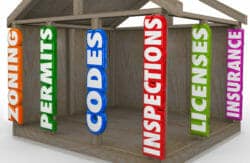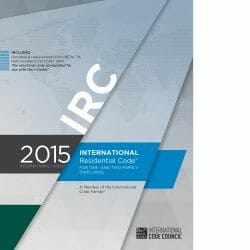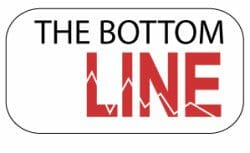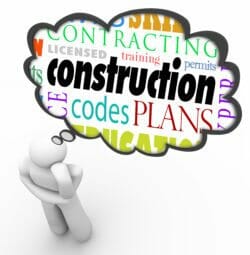Codes – A General Overview – Which Ones Apply To You?
Home » Codes & Permits »
Building Codes
Codes can be very confusing for buyers and sellers. Often they do not know what codes apply to them or the home being sold. Then the questions of permits will often come up in the same conversation.

What are codes?
Codes are the guidelines, rules or requirements that contractors, builders, plumbers, electrician, etc. must follow when doing their work. Codes are considered to be a minimum set of standards designed to protect the general public’s health and safety. Contractors, builders and other can exceed the codes but cannot do less than required.
Who enforces the codes?
When a home or structure is being built, remodeled or repaired, it must meet the codes. The Building Department ( often called the Department of Building and Safety, or the local building jurisdiction) is responsible to seeing to it the building and work conforms to the codes. They do this through having plans go through plan check and/or requiring permits to be obtained for the work being done.
Inspections insure that the codes are being followed
Conformance to the plans and codes is accomplished though having inspections of the work done. The inspections are generally performed by local building officials, often called building inspectors.
There are actually a number of codes

First, when discussing codes, it is important to know what codes you are talking about, for there are many codes. Also, are you discussing the code at the time the work was being done or the current code?
The IRC, International Residential Code, is probably the most often code referred to when discussing code issues on residential homes.
Sections or parts of the IRC code references other codes, including the International Plumbing Code, the International Mechanical Code, the National Electric Code, and various National Fire Protection Association standards. Therefore, if a municipality adopts the International Building Code, it also adopts those parts of other codes referenced by the IBC. Often, the plumbing, mechanical, and electric codes are adopted along with the International Building Code / International Residential Code.
ICC building codes
- International Building Code
- International Fire Code
- International Plumbing Code
- International Mechanical Code
- International Fuel Gas Code
- International Energy Conservation Code
- ICC Performance Code
- International Wildland Urban Interface Code
- International Existing Building Code
- International Property Maintenance Code
- International Private Sewage Disposal Code
- International Zoning Code
- International Green Construction Code
Note: As a model code, the IRC is intended to be adopted in accordance with the laws and procedures of a governmental jurisdiction. When adopting a model code like the IRC, many jurisdictions amend the code in the process to reflect local practices, requirements and laws.
“Historical tidbit” – Ancient Babylonian Code in 1772 BC
Codes written on stone and clay tablets spelled out what happens to a builder if he built an unsafe house. If a builder build a house for someone and complete it, he shall give him a fee of two shekels in money for each sar of surface.
- If a builder builds a house for someone, and does not construct it properly, and the house which he built falls in and kills its owner, then that builder shall be put to death.
- If it kills the son of the owner, then the son of that builder shall be put to death.
- If it kills a slave of the owner, then he shall pay slave for slave to the owner of the house.
- If it ruins goods, he shall make compensation for all that has been ruined, and inasmuch as he did not construct properly this house which he built and it fell, he shall re-erect the house from his own means.
- If a builder builds a house for someone, even though he has not yet completed it; if then the walls seem toppling, the builder must make the walls solid from his own means.

Bottom Line
Buyers and sellers should be cautious when making general statements about codes. Statements like “everything is up to code” or “built to code” can be misleading or wrong, so try to avoid these types of statements.
It is always wise to check with the local building jurisdiction or building department when questions or issues come up regarding codes.



